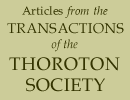Winter meeting.
ON Wednesday, the 18th of February, 1914, a meeting of the Society was held in the Exchange Hall, by kind permission of the Mayor, at 4.30 p.m., upwards of fifty members and friends being present. The following papers were read by Mr. Sydney Race and Mr. Samuel Corner.
THE BRITISH MUSEUM MS. of the LIFE OF COLONEL HUTCHINSON, and its RELATION TO THE PUBLISHED MEMOIRS.
By Mr. Sydney Race.
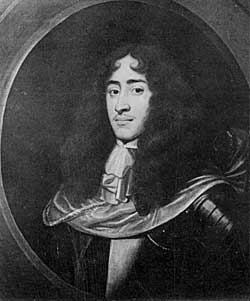
COLONEL JOHN HUTCHINSON. The Nottingham Castle Museum Portrait. By permission of the Castle Museum Committee.
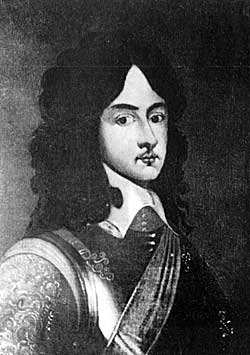
COLONEL JOHN HUTCHINSON. The Peterhouse Portrait. Reproduced by permission of the Warden, Sir Adolphus Ward, and the Fellows of Peterhouse, Cambridge.
In the British Museum, exhibited in the King's Library side by side with the manuscripts of many of the great English classics, is a Life of John Hutchinson, Governor of Nottingham Castle during the great Civil War, written by his wife, Lucy Hutchinson. This MS. has a special interest for Nottinghamshire people. The original editor of the Memoirs, the Rev. Julius Hutchinson, in the preface to the first edition published in 1806, stated that there had come down to him four MSS. in the handwriting of Lucy Hutchinson: "1st the Life of Colonel Hutchinson, 2nd A book without a title, but which appears to have been a kind of diary made use of when she came to write the Life of Colonel Hutchinson, 3rd A Fragment, giving an account of the early part of her own life . . . and 4th Two Books treating entirely of religious subjects." Of these, the first forms the Memoirs as they are popularly known, and the third is printed and accompanies the Memoirs, and the two books1 of the fourth have also been printed, though the volume is rarely to be found and scarcely ever read. The second, however, of which the British Museum MS. forms part, has never been printed in its entirety, and no use of it was made by the many editors of the Memoirs until Professor Firth first published his invaluable edition in 1885.2 The particular interest in the British Museum MS. lies in the variations between it and the narrative as finally prepared by Mrs. Hutchinson for publication, and particularly in the additional light which it throws on the events connected with the defence of the Town and Castle of Nottingham. Though the Memoirs were professedly written by Mrs. Hutchinson for her children, it is a fair assumption that they were intended for publication, and in all probability she was inspired to this course by the publication of the Life of the Duke of Newcastle by his Duchess in 1667. The Colonel died in 1664, and about the later course of his life, owing to the steps he had taken to escape the fate of the other Regicides, there must have been some suspicion among those who had fought on the Parliament side. Mrs. Hutchinson had therefore the double task of not only vindicating the Colonel's public career, but of presenting a picture of him which would bear comparison with that drawn by the Duchess of the rival Cavalier leader. A comparison of the MS., which is undoubtedly the earlier narrative, with the Memoirs, shows how she accomplished her task. In the MS. there are some passages which might have been considered by the Colonel's enemies to reflect on his character and conduct. These are omitted3 from the Memoirs, while the actual part which he plays in the history of his time is heightened by little touches here and there, so that he becomes the central figure of the story. It may be noted that as the Duchess added to her story "the true relation of my birth, breeding and life," so Mrs. Hutchinson had written an account of her life—which unfortunately has only come down as a fragment—to precede the Memoirs of her husband.
The MS. in the British Museum is only a fragment of the whole. The story which it tells commences at page 106 of the edition of 1808,4 and ends at page 247, so that it covers about one-third of the printed Memoirs. Incomplete sentences begin and end the MS., and that what the British Museum possesses is only a fragment of the whole, is clear from the fact that the original editor quoted a long passage from it which appears at page 82 of the printed Memoirs. In all, there are eighty-nine sheets of Mrs. Hutchinson's MS. in the British Museum.
Towards the end of 1912, the Nottingham Castle Museum made a most interesting purchase, through a London bookseller, of one additional sheet of the MS. This sheet was found to follow on immediately after the last of those in the possession of the British Museum, and its history was given in a memorandum which accompanied it, and which reads as follows:—
"The subjoined pages are taken from the MS. notes of Lucy Hutchinson, her first attempt to compile the life of her husband. The MS. was given to me by the family solicitor, and the five vols.,5 all transcribed by Lucy Hutchinson, of the life afterwards published were some time in my possession. These notes were examined with her own private pocket-book, and the handwriting is exactly the same. I lent the MS. to Sir S. Romilly, who was equally struck with the perfect taste in which Mrs. Hutchinson had erased some passages to remodel the narrative. The extract from the journal of the House of Lords, &c., is clearly from another hand.
Anne D. B. Montagu."
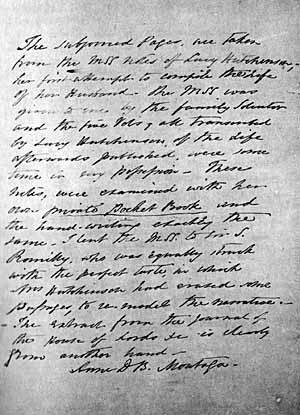
THE HUTCHINSON MEMOIRS AND MS. : MISS MONTAGU'S MEMORANDUM. From the original in the Nottingham Cattle Museum.
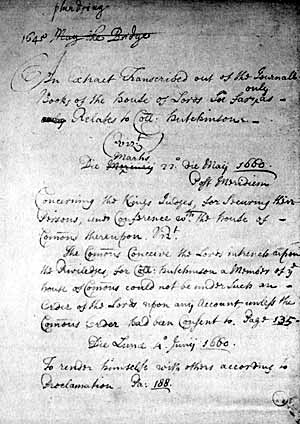
EXTRACTS FROM THE HOUSE OF LORDS' JOURNAL. From the original in the Nottingham Castle Museum. (The words at the head are in Mrs. Hutchinson's handwriting, the rest has been copied by her amanuensis.)
The extract from the Journal of the House of Lords, to which the memorandum refers, was contained on another sheet6 also acquired by the Nottingham Castle Museum. This sheet contains the first portion of extracts which are completed on another sheet bound up with Mrs. Hutchinson's MS. in the British Museum. It is a contemporary copy made by Mrs. Hutchinson's amanuensis, who may have been the daughter to whom in old age Mrs. Hutchinson wrote "on the Principles of the Christian Religion."
Unfortunately Miss Montagu's memorandum has neither address nor date, but following the signature is written in pencil "afterwards Mrs D. B. Proctor." The MS. in the British Museum bears a note that it was purchased from "Mr Proctor, 12th November 1864," but on reference to the British Museum it was ascertained that it had really been obtained from a Mrs. Proctor. Mr. J. P. Gilson, the head of the Department of Mnnuscripts, has been good enough to suggest that in all probability this "Mrs Proctor" was really Mrs. Anne B. Procter, the wife of Bryan Walter Procter (Barry Cornwall), the friend of Dickens, Thackeray, and the Brookfields, and the centre of a brilliant literary circle in early and mid-Victorian days.
Mrs. Procter's maiden name was Skepper, but it is not unlikely that after the marriage of her mother, the widow of a York solicitor, to Basil Montagu, who was a familiar figure in political circles in London in the early years of the last century, she would be accustomed to sign her name as Anne Montagu. Barry Cornwall married Miss Montagu (or Skepper) in 1824, so that the memorandum in the Castle must have been written before that date, and the reference to Sir Samuel Romilly would seem to indicate that it was composed before that famous lawyer's death, which took place in 1818.7
The memorandum signed by Miss Montagu makes it clear that she had the whole of the "diary"8 in her possession, and also the MS. of the Memoirs proper, though the latter eventually passed out of her hands. Of the ultimate fate of the MS. of the Memoirs, there is at present no clue. The Rev. F. E. Hutchinson, lately Vicar of Tisbury, Wiltshire, who is the head of the surviving branch of the Hutchinson family, says there is a tradition that the original editor's solicitor carried off the MS., together with other valuables of the family, to America in 1812, but all trace of him was lost from the sailing of the vessel in which he had set out. The originals of the portraits which are engraved in the Life have also disappeared, though a diligent search was made for them only two or three years ago by an American, who has interested himself in the pedigree of the family. The facsimile of Mrs. Hutchinson's MS. will show how clearly and accurately she wrote. She uses a few abbr iations, such as "yt" for "that," "yn" for "then," "G." for "the Governor," "P." for "Parliament," and so on, but with these few exceptions, the MS. could be printed almost exactly as it is written. The spelling is delightful, and half the charm of the Memoirs is lost when it is modernized. Fortunately, the Rev. Julius Hutchinson was careful to print the Memoirs as he found them, but it is possible that he omitted to reproduce the sub-headings which are found throughout the MS., and which one can imagine would be also found in the Memoirs. In these, we frequently get Mrs. Hutchinson's candid opinion of her husband's rivals; thus in the MS. are to be found: "Col. Pierpont; his proposition to the Towne: His false dealing;" "Pierrepont's undermining rivalrie discovered to ye Governor by Sir J. Meldrum;" "Dr Plumtre's challenge or libell to ye Governor," or a side-light like this: "Another design on Museum Bridge: 60 fatt oxen taken."
One interesting peculiarity of the MS., which is not found in the Memoirs, is Mrs. Hutchinson's use of code letters to designate two officers of the garrison—Colonel Thornhagh and Captain White. The former is C.L. 19 and the latter P.C. or C.L. 21. This only happens six times in the MS., and one of the passages is not found in the Memoirs. It occurs in Mrs. Hutchinson's description of one of the many disputes with the garrison as to the Colonel's powers (page 187, Memoirs).
"Gentlemen, sayd he, I received these publick affronts from you that no Governor in the world beside myself would have put up. At a publick Councell of Warre, among all the officers, enough to have caused mutinie, it was propounded how farce my command and my comission extended, and questioned whether or no I could command horse.
"P.C. 21 answered it was not I that did it. No, sayd the Governor, but you were present when CL 19 did it, and but that I infinitely respected the gentleman, I could not so quietly have suffered it, but besides that, all of you at the Councell of Warre ordered that the bootie taken should be at the dispose of him that commanded your partie, so that if a Corporall goe out, he hath power to dispose the bootie, which in all garrisons is the Governor's right to doe."
It is a little difficult to understand why Mrs. Hutchinson used these code letters so occasionally, but possibly she lapsed unconsciously into using the same symbols as the Colonel employed in his official communications with the authorities in London.
The first fifty pages of the MS. contain much new matter descriptive of the manner in which Colonel Hutchinson acquired his commission to be Governor of the town, and it is remarkable that in the Memoirs the difficulties are all smoothed away, so that it hardly appears that the Governor was a competitor with Colonel Pierrepont for the office. In the Memoirs (page 117) it is stated that "Mr John Hutchinson and his brother were persuaded to be lieutenant colonell and major to Colonell Pierrepont's regiment of foote." In the MS. it is put quite differently:—
"The well affected in Nottingham thought they had now a just occasion for their own defence to put themselves into a posture of warre, and with much adoe they gott Col. Pierrepont to owne his commission. Mr John Hutchinson was his Lft Colonel,9 and Mr George Hutchinson was then charged Captaine by the Towne, afterwards Major of the regiment. He first beate his drum, and had a very complete armed companie ye first day after Mr John Hutchinson had ruined his company. It was six weeks after this before Colonel Pierrepont could be gotten to raise the Towne Company."10
The Memoirs read that by reason of the coldness of Colonel Pierrepont, "the affaires of the warre at Nottingham went more tardily on than else they would have done" (page 122). In the MS.:—
"By reason of the coldnesse of the Colonel who could not be persuaded to engage his father's tenants, nor to use his power, which might then have been very advantageable to the cause, to raise a considerable force, but on the contrary, was for ease to all malignants; that nothing could be done against them . . . and he would not suffer them to be touched."
(1) The Rev. Francis E. Hutchinson, of Tisbury, Wiltshire, has the manuscript of these books, which are entitled "On the Principles of the Christian Religion and on Theology." He also possesses one other manuscript book, consisting of translations of Italian and other poems, some metrical versions of the Psalms, and translations of the first four books of the Aeneid, all in the handwriting of Mrs. Hutchinson.
(2) In the Appendix to his edition of the Memoirs, Professor Firth prints seven long extracts from the British Museum MS. which are not reproduced here, and he gives also in the text some shorter extracts from the MS. Use has been made in this paper of the two articles on the MS. printed in the Nottingham Guardian of February 3rd and May 13th, 1913, but otherwise an endeavour has been made to reproduce only what will be new to readers of the Memoirs.
(3) One of the most striking of these omissions is that of the account which is to be found in the MS., of the torture of the boy spy and of one of the soldiers of the garrison. Professor Firth gives this passage is full.
(4) The sccond edition of the Memoirs to which all the references are made.
(5) As written.
(6) The two leaves and Miss Montagu's memorandum were inset very neatly in a wide grey mount, and had formed part of what was evidently a valuable scrap book of autographs and prints, which had been sold at one of the great London book sales, and afterwards broken up by the buyer.
(7) Hurry Cornwall died in 1874, but his wife survived till 1888, when she had attained her 89th year. The writer of her husband's life in the Dictionary of National Biography says that she was "a lady of great gifts, both social and intellectual," and that she was "long the centre of a highly cultivated circle, which delighted in her shrewdness and wit."
(8) Though what is here described as the British Museum MS. was termed by the Rev. Julius Hutchinson a "diary," it is clear that it is not a diary proper, seeing that dates and other information are frequently omitted from it, which a diarist could readily have supplied.
(9) A copy of Colonel Hutchinson's commission, in Mrs. Hutchinson's handwriting is bound up with the British Museum MS. It reads as follows:— "Thomas Lord Grey of Grooby nominated & appointed Major Generall of such forces as are or shall be raised within the severall counties of Nottingham, Rutland, Derby, Leicester, Northampton, Huntingdon, Bedford, & Buckingham, & imployed for the defence of the Protestant Religion, the safitie of his M'ties person & of the Parliament, the preservation of the lawes, liberties, & peace of the Kingdome & protection of his M'ties Subjects from violence & oppression. "To John Hutchinson Lt. Coll. "By vertue of the authoritie given me by the Right Hon. Robert, Earle of Essex & Ewe, his Excellencie Captaine Generall of all the forces & armie employed by the Ordinance of the Lords & Commons in Parliament, I doe constitute & appoynt you Lft Col. in the Regiment whereof Francis Pierrepont Esq is Colonell, to serve for the defence of the King Parliament & Kingdome above mentioned which said Regiment you shall by virtue of this Commission receive into your charge as Lft Collonell from the sayd Colonell. These are therefore to require you to make your present repaire to the sayd Regiment & taking the same into your charge as Lft Coll. diligently to exercise the officers & souldiers in armes, commanding all inferior officers & souldiers of the said regiment to obey you as their Lft Collonell for the service above mentioned according to this commission given you, & you likewise to obey & follow such orders & directions as you shall receive from myselfe, his excellencie, or from one or both Houses of Parliament according to the discipline of warre. " Given under my hand & seale, this 9th day of Januarie 1642 "Thos Grey."
(10) The names of the local leaders on both sides which are here given In the Memoirs arc not found in the MS.
